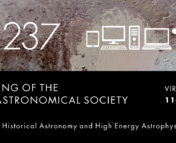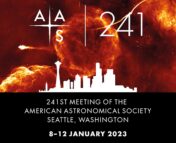This post was written by a coalition of early career researchers (ECRs) from the California Planet Search (CPS). CPS is a research collaboration of exoplanet astronomers from universities across the US, but primarily based in the University of California system and CalTech.
Content warning: The following Astrobite will discuss issues pertaining to sexual violence and harassment.
One of the most notorious sexual harassers in astronomy recently appeared as a coauthor on an arXiv preprint. After much outcry and an ongoing investigation by the AAS, his name was removed from the author list. This “authorship debacle” is just the latest example of an ongoing pattern that continues to force early career researchers (ECRs) into no-win scenarios, damaging both their mental health and professional reputations.
First, some context for why this happened. The California Planet Search (CPS) is a collaboration between participating scientists, observers, and PIs (principal investigators) who use the HIRES spectrograph (soon to be replaced with the Keck Planet Finder, or KPF) on the 10-m telescope at Keck Observatory. Because cadence is critical for studying exoplanets using the radial velocity (RV) technique, PIs will pool the time they earn in order to maximize observing cadence on individual stars. For example, if you were allocated 3 nights on Keck/HIRES to measure the mass of an exoplanet on a 3 month orbit, you would want to make RV measurements regularly over many months to trace out the planet’s orbit, not just on the three calendar nights you were allocated. CPS allows the astronomers using Keck to spread out those three nights by combining everyone’s calendar nights and observing everyone’s stars once per night, thus maximizing the science return. A significant fraction of all Keck/HIRES RVs are observed through the CPS collaboration and this ad-hoc queue structure, which relies on the time volunteered by ECRs, particularly graduate students and postdocs, to spend late nights on the telescope obtaining these observations. Most of the ECR observers work for CPS PI’s directly, and there is a social expectation that to be part of the collaboration, you have to participate in observing.
A founding member of CPS was Geoffrey Marcy. Marcy resigned from the UC Berkeley Astronomy Department in 2015 after he was found guilty of a decades-long pattern of sexual harassment (that he at least partly admitted to), including sexual assault. The same year this occurred, he ceased formal ties with CPS, but has since been included as a coauthor on a number of works published by other CPS members (e.g. Fulton et al. 2021, Rosenthal et al. 2021, Hirsch et al. 2020, Weiss et al. 2018, Petigura et al. 2017) for work he contributed prior to resigning (primarily data collection and project inception).
The most relevant of these were the two papers published in 2021 (Fulton et al. 2021, Rosenthal et al. 2021) as part of the California Legacy Survey. While these papers were in preparation, many of us (ECRs of CPS) were forced into the excruciatingly difficult position of having to decide between remaining on the paper to receive credit for their contributions, or refusing to have their name associated with Marcy. Many of us (individually, or in small groups) expressed their opposition to Marcy’s inclusion to CPS leadership by direct confrontation, hosting discussions about the impact of sexual harassment on astronomy students, and seeking advice from others in the community. However, at the time, we were isolated from one another. Many of our mentors told us that including Marcy on papers was common practice, and although we were hurt and uncomfortable, we did not know how to change it. The day before these two papers were posted on arXiv, Marcy became the first person ever to be expelled from the National Academy of Sciences. The CLS papers’ inclusion of Marcy sparked many vigorous online discussions. Following this, we informed the CPS leadership we did not want to be coauthors on any future papers which would include Marcy. This incident in 2021 was a turning point for the unity of ECRs in CPS. Supported by people in the broader community, and validated by the public outcry, we organized among ourselves, found community, and realized that our fear and discomfort were shared. The fact that we are writing this letter now, united, is a testament to these years of internal organizing and growth.
Two years later, in April 2023, CPS scientists authored a paper about the Kepler Giant Planet Search (KGPS), which again made use of archival Keck/HIRES RVs. The paper included Marcy as the third author to the surprise of many people, including several of the other coauthors on the KGPS paper. These authors said they were never made aware that Marcy would be a co-author, and that his inclusion on the author list appeared in the paper draft about a week before submission. Many retracted their authorship from the paper in response, and the paper has since been withdrawn from the arXiv.
Additionally, coauthorship was not offered to any of the ECRs who observed for this project. The paper presents about 2850 RVs; Roughly a third of the observing labor was carried out by current ECRs across hundreds of collective hours of observing. Long standing practice (although not written policy) within CPS has been to be generous with offering coauthorship to observers, as it is viewed as compensation for the time they volunteer (observers are not otherwise paid for this work, which requires late nights, often on weekends and holidays). Usually coauthorship is offered to anyone who contributed a minimum of 10 RVs, a standard which was used for the CLS papers (similar in survey design and execution as KGPS). For KGPS, an unprecedentedly high threshold was decided: 10% of the total sample (285 RVs) collected by a single individual would merit coauthorship to avoid placing junior members among the authors list alongside Marcy. Only the first four authors, including Marcy, met this 10% threshold.
Perhaps unsurprisingly, many of the ECRs of CPS were dismayed both with the inclusion of Marcy as third author and our exclusion. We were told that Marcy’s inclusion on the paper was necessary in order to preserve the historical record of work contributed to the paper; however, the preservation of this record did not seem to extend to include our own contributions. We organized a response and wrote a collective letter to CPS leadership explaining our perspective on the topic of legacy authorship for serial harassers, and how this issue deeply affects us both personally and professionally. As a result, Marcy has voluntarily retracted his coauthor status on this and on all future CPS papers, and a group code of conduct is in the works that will formalize this commitment in writing. We reiterate here what we have tried to stress to CPS leadership; there is no science that is more important than the people it impacts.
Broader Impacts
Confronting a serial abuser’s name in a prominent, celebrated position on an author list was difficult for everyone, and this was especially true for survivors of sexual harassment, abuse, and assault. No matter the justification for Marcy’s inclusion, the impact of this particular decision was severe. For us, the junior observers left off of the paper, it raised questions about the extent of Marcy’s involvement in the paper, and whether or not the other authors of the paper understood the magnitude of Marcy’s harm to other scientists. We lost weeks of work to PTSD, internal organizing, and burnout. We sent each other memes and pictures of our cats as we cried in bed.
It was particularly frustrating to have to explain coherently why this situation was upsetting while suffering the consequences. We knew we had to be well-spoken and put-together in order to be taken seriously, but we were exhausted and suffering. For many of us, our professional deadlines did not change.
The issue of Sexual Harassment and Assault (SH/SA) in Astronomy is much larger than Geoff Marcy and the CPS. There are people in departments everywhere who are guilty of SH/SA—some of whom you may know about from whisper networks, and some of whom manage to fly under the radar. Every department also has survivors of SH/SA. It is critical to create a safe and healthy work environment for not only survivors, but for everyone to do their best science. This problem is pervasive, and the solution will require active efforts and policies specifically designed to protect survivors.
One way to cultivate a safe working environment within your research group or collaboration is to have a code of conduct with a zero tolerance policy for SH/SA that specifically addresses the consequences of being found guilty of these behaviors (one such example is the NEID Code of Conduct). Individuals who sign a code of conduct yield their right to collaboration, data collection, access to students, or rights to authorship depending on the severity of the situation. On a broader level, the AAS ethics committee has suggested reclassifying SH/SA as research misconduct, which would give journals and other organizations more ability to restrict authorship or participation. We can use acknowledgements for situations where authorship would normally be warranted, but is no longer appropriate due to an individuals’ actions.
Lastly, it can make a world of difference to your students’ sense of safety just to know that they are valued and supported. In groups that defend known serial harassers, such as Marcy, it can be difficult for students to feel safe coming forward with any issues or experiences of their own. Conversely, knowing that an advisor or group leader will believe and advocate for them will foster a sense of trust and safety. Safe working environments not only allow students to do their best science, but to be healthier and happier humans.
No department, research group, or collaboration is the same and no singular solution will work for every organization. We encourage all who read this to think about ways that you can cultivate a safer environment in academia for yourself, your peers, and your students.
Signed,
A Coalition of Early Career Researchers from the California Planet Search
Featured Image Credit: Brian Harris
Disclaimer: This article was edited by a group of Astrobites authors, who are graduate student volunteers. It is not intended to be representative of the views of the AAS (which supports Astrobites) or other institutions with whom our authors are affiliated.




